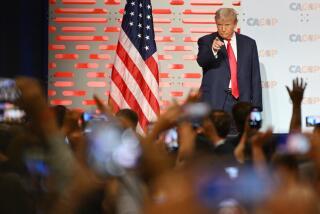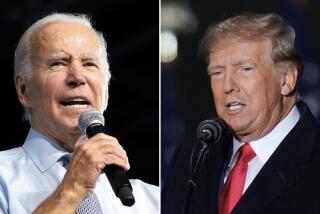A distracting book for a distracted president
Fate often has a sense of humor: This week, Donald Trump, a president who never reads, was buried by a book.
For Trump, this could have been a good week. A holiday period in which he kept mostly quiet and out of the headlines had allowed his standing in polls to rise a bit, and more good economic news should have provided the White House with plenty to talk about.
Instead, “Fire and Fury.”
I’m David Lauter, Washington bureau chief. Welcome to the Friday edition of our Essential Politics newsletter, in which we look at the events of the week in Washington and elsewhere in national politics and highlight some particularly insightful stories.
A PUBLICITY BOOST LIKE NONE OTHER
“Where do I send the box of chocolates?” Michael Wolff, the author of the new book, said in an interview on the “Today” show Friday. Trump and his aides, he said, not only had given his book publicity beyond what any publisher would spend, they had helped “confirm what’s in it.”
Indeed, by ordering his lawyers to send an obviously futile “cease and desist” letter to Wolff and his publisher, Trump virtually guaranteed a bestseller.
That he made himself look weak in the process and illustrated the book’s claim that he indulges in self-defeating tantrums only deepened the week’s folly.
As for the book, itself, as virtually everyone with an interest in politics by now seems to know, it offers a portrait of a president held in contempt by many top aides, incapable of paying attention to the briefings they struggle to give him and prone to volatile, ill-considered emotional outbursts.
Based heavily on interviews with the president’s former chief strategist, Stephen Bannon, and hours spent hanging out in the West Wing in the early months of the Trump presidency, Wolff’s book doesn’t plow new ground. Instead, it deepens and darkens the picture of Trump’s White House already painted by the major news organizations that have covered him since the start.
But the book threatens Trump, nonetheless, in three significant ways:
- Its extensive quotes from Bannon, Roger Ailes and other figures on the right validate criticisms of Trump that conservatives can more readily dismiss when they come from news sources they mistrust.
- By deepening the mistrust between Trump and his advisors, the book will inevitably hasten the departures that already have begun to erode the administration’s top ranks. It’s already caused a deep, maybe even permanent, rupture between Trump and Bannon, as Brian Bennett and Noah Bierman wrote.
- Trump’s own furious reaction to the publication has drawn him into yet another of the high-decibel battles that have consistently driven down his standing with the public.
Trump’s defenders have sometimes tried to argue that the president’s frequent controversies formed part of a master strategy to deepen his connection with his supporters — “my base,” as Trump likes to refer to them.
Time and again that’s been proved false. While some of Trump’s most ardent backers love him for the fights he picks, most voters dislike the constant Twitter wars and the incessant quarreling.
In Alabama last month, Trump fatigue played a major role in the victory of the Democratic candidate for Senate, Doug Jones, according to his media strategist, Joe Trippi.
“The sense of chaos, the constant fight, fight, fight and alarm bells going off all the time” were what voters were reacting against, Trippi told me.
“There’s this sense of being on edge,” which voters talked about frequently, Trippi said. “That’s what they don’t want anymore.”
A WAVE STARTING TO BUILD
All this comes at precisely the wrong time for Republicans, who are struggling to counter a Democratic wave that is building ahead of this year’s midterm elections.
With a strong economy that is driving down unemployment and beginning to push up wages, Republicans have an opening to make a case to voters to keep their majority in Congress.
But every time Trump distracts attention to another topic, Republicans lose another chance to make that argument. And Trump can’t resist distractions.
A lot is at stake in the midterms, as Mark Barabak explained: control of Congress and more than two-thirds of the nation’s governors will be on the ballot in November.
OFFSHORE DRILLING, ONSHORE TOKING
While Wolff’s book dominated the news, the administration did take two big policy steps this week — both of them carrying political risk.
Atty. Gen. Jeff Sessions, who has long crusaded against legalization of marijuana, changed Justice Department policy to open the way for federal prosecutors to target recreational pot in states where it’s legal. That placed thousands of marijuana businesses at risk in California and five other Western states that have fully legalized, as Evan Halper, Joe Tanfani and Patrick McGreevy wrote.
Administration officials probably don’t care much about the angry reactions from California Atty. Gen. Xavier Becerra and other state officials. They have little to lose in California, where Trump these days is only slightly more popular than a wildfire.
But the furious reaction from Colorado’s Republican Sen. Cory Gardner gave a good indication of the political problems that a crackdown could bring in other states where voters have gone for legalization. Sessions was trampling on the will of the voters, said Gardner, who heads the GOP’s Senate campaign operation.
A fight over pot could further endanger Nevada’s Republican Sen. Dean Heller, his party’s most at-risk Senate incumbent.
The politics are similar for the administration’s other big policy move this week — expanded offshore drilling, including opening up coastal waters near Florida and California that have been off-limits since the Reagan administration.
As with pot, the California reaction probably doesn’t matter much to Interior Secretary Ryan Zinke, who announced the decision.
But administration officials do care about the politics of Florida, where Republican Gov. Rick Scott, who is thinking about a Senate race, quickly moved to distance himself from the decision.
One other policy move this week: The administration announced details of its effort to make skimpier health plans more available, Noam Levey reported.
AVOIDING THE GOLDEN STATE
As Brian Bennett wrote, when Trump finished the calendar year, he became the first president not to visit California in his initial year since Dwight Eisenhower.
California isn’t alone. With the exception of New York and New Jersey, where he owns property, Trump has avoided most blue states. And he seldom travels west of the Mississippi, preferring short trips that enable him to get home quickly.
MORE DEADLINES AHEAD
Deadlocked on many policy issues, Congress keeps passing short-term extensions of its deadlines. The next drop-dead date comes on Jan. 19.
White House officials and congressional leaders restarted talks this week on the main issues they face — the budget and immigration, Lisa Mascaro reported.
In the Senate, there’s increasing pressure to reach a deal on the status of the roughly 700,000 young immigrants known as Dreamers, many of whom face the risk of deportation because of Trump’s decision to cancel the Obama administration’s DACA policy.
Meantime, the federal deficit is growing, and it’s likely to get worse because of the Republican tax bill and the huge cost of disaster aid from the wildfires and hurricanes of 2017. That means Congress likely will need to raise the debt limit sooner than expected, perhaps in early March, Jim Puzzanghera reported.
Republican leaders generally need help from Democrats to pass money bills, so each of these deadlines gives the minority party leverage to win policy concessions.
TAXING INTERNET SALES
In 1992, the Supreme Court ruled that states generally couldn’t force internet retailers to collect sales taxes. The ruling has been criticized for years, and the high court may be on the brink of reconsidering, David Savage reports.
The justices could decide next week whether they’ll take up an appeal of the issue brought by South Dakota and several other states. We’ll be following along.
STEPPING AWAY FROM THE BUTTON?
Earlier this week, Trump startled the country with a tweet bragging that his “Nuclear Button” was bigger and more powerful than Kim Jong Un’s.
But as Tracy Wilkinson reported, just two days after that display of phallo-diplomacy, Trump agreed to delay U.S.-South Korean military exercises. The agreement to put off the military maneuvers came at the request of South Korea’s president, who has been trying to ease tensions with North Korea.
ALL THE PRESIDENT’S TWEETS
Whether the topic is North Korea or Bannon, Twitter has long been Trump’s favored means of pushing his message. We’re compiling all of Trump’s tweets. It’s a great resource. Take a look.
LOGISTICS
That wraps up this week. My colleague Christina Bellantoni will be back Monday with the weekday edition of Essential Politics. Until then, keep track of all the developments in national politics and the Trump administration with our Essential Washington blog, at our Politics page and on Twitter @latimespolitics.
Send your comments, suggestions and news tips to politics@latimes.com.
If you like this newsletter, tell your friends to sign up.
More to Read
Get the L.A. Times Politics newsletter
Deeply reported insights into legislation, politics and policy from Sacramento, Washington and beyond. In your inbox three times per week.
You may occasionally receive promotional content from the Los Angeles Times.







